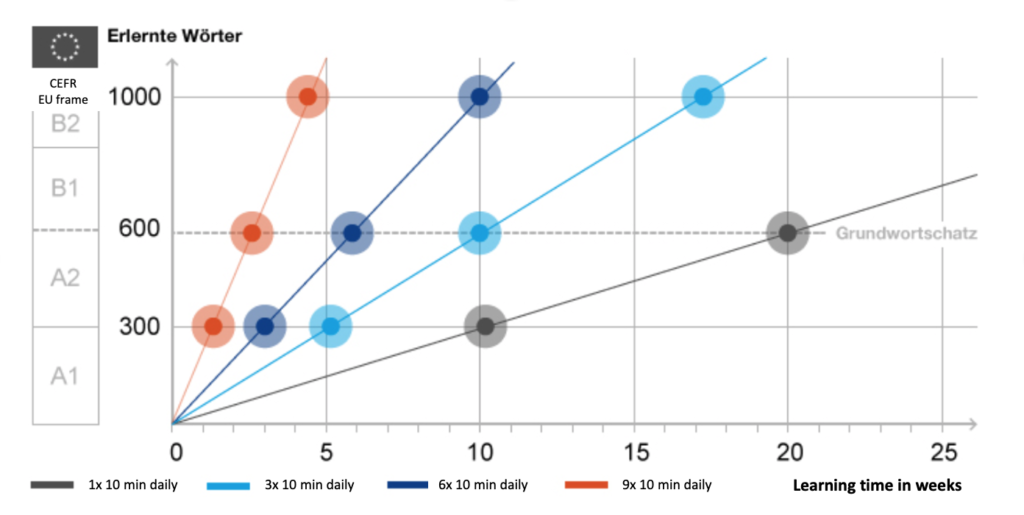Interval training – this term is familiar from sports and describes a training method characterized by alternating periods of activity and recovery. Such intervals also make sense when studying!
Interval training also makes sense when learning languages!
Use the “construction” of your brain! It continues to learn for about 7 minutes after each recording phase (even with other content), although you are already concentrating on entirely different things. Therefore it makes sense to divide your learning into learning units of 10 minutes each. This accelerates the learning speed, and the time until you have reached your desired level, becomes shorter – especially in comparison to conventional vocabulary cramming.
This means short learning units, but several times a day!
Learning phase model – bridging plateaus
Before you start learning, we would like to point out George Leonard’s learning phase model. When you build up abilities, your brain begins to store them. However, only those parts you recall repeatedly are held to be available permanently and quickly.
During this process, you most likely have the feeling that nothing is progressing, and you are increasingly losing interest. And this is precisely the main reason why many give up after a short time and say, “I can’t do this at all,” “I don’t understand this,” or “I’m not suitable for this.” When you reach this point, keep recalling the knowledge you have already learned and try to do at least one exercise a day during this time. Short learning units are better!
By doing so, you will bridge this short stagnation phase (= learning phase plateau) and quickly see how exciting it will be afterward and how your speed and fun will increase. And suddenly you will realize: “I can do it!“
Learning units in language learning – learned words
The more short learning units per day, the more words learned! You decide how fast you want to progress.
The rule of 6:
A typical value we know from our customers is the rule of 6. This means that in 6 weeks, you will master 600 unique words (active vocabulary, such as used in a daily newspaper) if you spend 10 minutes 6 times a day studying.
TIP: In the intensive course, you will reach one thousand words in two weeks. You can achieve this with 15 exercises of 10 minutes per day.
Find your personal goal in the chart below. Either determine how many 10-minute exercises you can do per day and see what vocabulary you will achieve. Or you define the vocabulary and use the graphic to find out how you will reach your goal best.
The display of the learned words in the figure below serves as a measurement for your orientation. You will automatically begin to understand the language. Every single word is only one component. You begin to immerse yourself in the language and to think in it.

Weekend forbidden?
Our brain knows no weekend! Just a few minutes of each activity are enough to show your brain that you haven’t dropped the ball. So at least do a minimalist exercise at the weekend. Show your grey cells that you are still “in training.” If you do not do this, you can assume that every 2-day break will set you back about three days. From a neuronal point of view, there is no doubt: Use it or lose it!
Vera F. Birkenbihl: “Two bars and not twenty!”
Try out Brain-Friendly MOVIES© for language learning
Imagine learning a foreign language as quickly as your mother tongue.
Brain-friendly offers language courses for the most common foreign languages, learning with a comedy series. Our classes are perfect for the interval technique. We assure brain-suitable studying, completely without boring vocabulary cramming. Instead, we focus on imitation – so you learn a foreign language as quickly as you learned your mother tongue.
